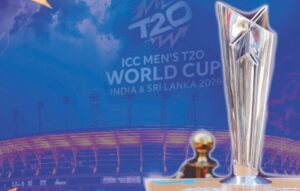Bobby Charlton, English soccer icon dies at 86

Manchester, The Gulf Observer: Bobby Charlton, an English soccer icon who survived a plane crash that decimated a Manchester United team destined for greatness to become the heartbeat of his country’s 1966 World Cup-winning team, has died. He was 86.
A statement from Charlton’s family, released by United, said he died Saturday surrounded by his family.
An extravagantly gifted midfielder with a ferocious shot, Charlton was the leading scorer for both United (249 goals) and England (49 goals) for more than 40 years until being overtaken by Wayne Rooney.
“Sir Bobby was a hero to millions, not just in Manchester, or the United Kingdom, but wherever football is played around the world,” United said.
“He was admired as much for his sportsmanship and integrity as he was for his outstanding qualities as a footballer; Sir Bobby will always be remembered as a giant of the game.”
Alex Ferguson, who managed United from 1986-2013, said before Charlton’s death that he “is the greatest Manchester United player of all time — and that’s saying something.”
“Bobby Charlton is absolutely without peer in the history of the English game,” Ferguson said.
Charlton was also renowned for his humility, discipline and sportsmanship. He was never sent off in 758 appearances for United from 1956-73 or 106 internationals for England from 1958-70.
Robert Charlton was born Oct. 11, 1937, in the coal-mining town of Ashington, northeast England, and his talent was obvious from a young age.
“We realized Bobby was going to be a bit special as a player when he was about 5 years old,” said Jack, his older brother. “He was always kicking a football or a tennis ball against a wall and when it bounced back it stuck to him like a magnet.”
Charlton wrote in 2007 that his family sometimes relied on illegally caught salmon or rabbit to ward off hunger, while his father — also named Robert — gathered coal washed up on local beaches and sold it to bolster his income.
His father’s commitment to his mining colleagues meant that in 1966 he missed Charlton scoring both goals against Portugal in that World Cup semifinal because he didn’t want someone else to have to cover for him in the pit. He was, however, persuaded to attend the final when the Charlton brothers lifted the trophy.
Charlton’s playing career began far from home in Manchester after leaving school at 15, making his United debut three years later against Charlton in 1956.
Within two years, tragedy struck the tight-knit group of United players whose relationship was forged as trainees in austere conditions. The team was still celebrating winning at Red Star Belgrade to secure a place in the European Cup semifinals when their plane caught fire on its third attempt to take off in heavy snow after a refueling stop in Germany.
Charlton miraculously emerged from the smoldering wreckage with only light head injuries and picked his way through the wreckage to help survivors. Spotting manager Matt Busby groaning in agony on the smoke-shrouded runway, Charlton rushed to help the father-figure who had promoted him to the first team.
But eight members of the “Busby Babes” team packed with bright prospects were among the 21 fatalities. They included Duncan Edwards, considered one of England’s most talented players at 21.
“Sometimes it engulfs me with terrible anger and regret and sadness — and guilt that I walked away and found so much,” Charlton wrote in 2007.
Charlton became driven by a lingering obligation to preserve the memories of the Munich dead, returning to action less than four weeks later and helping a hurriedly assembled team of survivors and stand-ins reach that season’s FA Cup final.
Busby rebuilt his team around Charlton, adding the 1965 and 1967 English league titles to the championship they won in 1957.
“There was always one great hope — the return to greatness of my beloved club,” Charlton said.
The biggest prize of his club career arrived in 1968 as United became the first English club to become champion of Europe. Charlton scored twice in a 4-1 extra-time win over a Benfica team containing Portugal great Eusebio.
But Charlton is perhaps best known for being part of the England team that won the World Cup. It remains England’s only major title in men’s soccer.
Charlton and his brother fell out over Jack’s public assertion that Bobby’s wife caused him to become estranged from his mother. But the pair reconciled and Jack presented Bobby with a lifetime achievement trophy at the 2008 BBC Sports Personality of the Year Award.
“We have had our public disputes, proving that in any family discord can sometimes disrupt the force of love and blood, but throughout that time I never lost the sense of wonder and gratitude that we were together in 1966 on such a great day in the history of our nation’s sport,” Bobby Charlton said.
Charlton was rarely seen in public in the final years of his life after being diagnosed with dementia. He was never forgotten, though.
“This man, from day one, was everything I wanted to be,” United striker Marcus Rashford wrote of Charlton after hearing about the diagnosis. “Kind, professional, caring, talented.”
Another former United player, Phil Neville, said Charlton deserved to stand alongside the likes of Pele, Diego Maradona and Lionel Messi as a soccer great, because of what he achieved and the way he did it.
“He’s up there with those players,” Neville said on NBC on Saturday.
He is survived by his wife, Norma, whom he married in 1961, and his two daughters.


